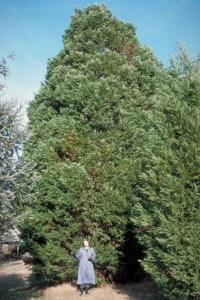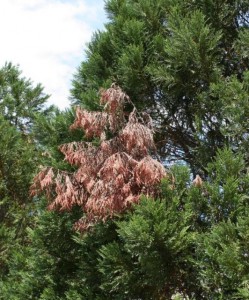
Leyland cypress, x Cupressocyparis leylandii, has been hugely popular over the past 20 years as an ornamental landscape tree. It has the reputation of being a beautiful evergreen that can grow at a rate of up to 3 to 4 feet per year. Sounds like the perfect option for someone looking to make their back yard more secluded and private. Because of these traits, it has been planted widely throughout the southeastern US, including the Florida panhandle, only to succumb to intense environmental conditions and disease pressure.
UF/IFAS suggests that other species be used in place of Leyland cypress because of the damaging effects of Seiridium canker. The disease is a fungal organism that attacks the tree after periods of drought while the tree is under stress. Once the stress has occurred and rain does arrive the fungus attacks the vulnerable trees in the wetter periods. The major symptom is “flagging” or branches that have turned brown that can be scattered throughout the tree. This is caused by a canker further up the brown branch that has been girdled,cut of from the flow of water and nutrients to the branch by diseased tissue.

What are the options for Florida panhandle landscapers and homeowners? If you have a tree exhibiting symptoms of Seiridium canker, pruning the “flag” branches out several inches below the canker can prolong the life of the tree but is very unlikely to save it. The only long term sustainable option is to replace Leyland cypress with species that are resistant to the disease. The following are good examples of species that could be considered:
|
Common Name |
Scientific Name |
|
Atlantic white cedar |
Chamaecyparis thyoides |
|
Southern red cedar |
Juniperus silicicola |
|
Arizona cypress |
Cupressus arizonica var. glabra |
|
Mexican cypress |
Cupressus lusitanica |
|
Oriental arborvitae |
Platycladus orientalis |
|
“Green Giant” arborvitae |
Thuja x ‘Green Giant’ |
|
Kashmir cypress |
Cupressus cashmeriana |
|
Chinese funeral cypress |
Cupressus funebris |
|
Chinese cypress |
Cupressus chengiana |
|
Hinoki cypress |
Chamaecyparis obtusa |
For more information read the University of Florida publication, Seiridium Canker of Leyland Cypress.
 0
0
